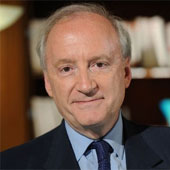NGOs — A French Perspective
How NGOs should function, what role do they need to play — and what are their special responsibilities?
October 3, 2001
International civil society is really a little bit of a jumble, or a mirage. There are more than humanitarian issues — usually quite admirable — involved.
It’s a mixed bag. You find a bit of everything — generosity, devotion, networks, militancy, interests, lobbies, beliefs, and a fair amount of disguised real power. Those who see a panacea in this phenomenon forget that it in no way gets rid of the hierarchies of power; it merely expresses them differently.
The emergence of an international civil society does not really modify the global balance of power — it merely expresses it differently.
The influential “civil societies” — and NGOs — are necessarily those of the most powerful countries. Thus, it’s the civil societies and the NGOs (non-governmental organizations) from the rich, media-driven countries that exercise influence in the world. They’re the ones with the means to communicate — and thus the power to impose their views.
It’s American influence — not that of Niger, Bolivia, or Bangladesh. It’s not Nigerian NGOs that are going to intervene in Northern Ireland or demonstrate in Seattle.
The emergence of an international civil society modifies the way we wield power and political responsibility, for example, by making people pay attention to things like human rights, antipersonnel mines, environment.
But it does not really modify the global balance of power, indeed far from it. Besides, many NGO from the “south” are extensions of NGO’s from the “north.”
Click here to order this book.
But is it really fair to equate the emergence of an international civil society with the advancement of democracy?
I don’t think so, not if we let things go without making progress toward better regulation. Civil society is not made up of elected representatives, but of active minorities and self-designated forces, which does not correspond to our democratic principles.
Some activists, especially in the West, seem to be convinced that the weakening of states, allegedly oppressive by nature, is a good in and of itself.
This does not mean that certain groups do not do useful, sometimes admirable work, but that in itself has no relationship to democracy.
Look at the specific, even picky, demands that we make of countries where we want to help democracy stick. We verify the electoral lists, the conditions for running for office, the respect of speaking time, finances, the role of the media, etc.
Are we supposed to ignore all this so long as there is some “civil society” in which someone has set up a website — or created an association? What do we know about these 26,000 existing NGOs? What do we know about their leaders, their resources, their recruiting, their working methods?
A bit more transparency would be welcome! Let’s take these forces and what they are expressing into account, but let’s avoid confusing roles and responsibilities!
Some activists, especially in the West, seem to be convinced that the weakening of states, allegedly oppressive by nature, is a good in and of itself.
It’s American influence — not that of Niger, Bolivia, or Banladesh. It’s not Nigerian NGOs that are going to intervene in Northern Ireland or demonstrate in Seattle.
They seem to think that as soon as states get out of the way, the most beautiful democracy will emerge in this newly liberated space.
That’s not exactly what has happened these last few years. In some ways, it’s often the jungle — not democracy — that has gained ground.
Look at the coincidence between the end of the Soviet Union, financial globalization and the explosion of organized crime! This new reality has to be analyzed without nostalgia, but also without naiveté.
Democracy is not like instant coffee, where you can just add water and stir. It doesn’t result from a conversion, but from a process. The development of civil society is a fact. We should make it more responsible and support its most useful aspects, but for states to abdicate their roles would mean progress neither for democracy nor for what we in French call the “management of globalization.”
Read previous
The World Economy Today
October 2, 2001
